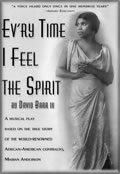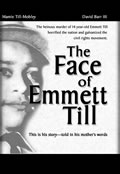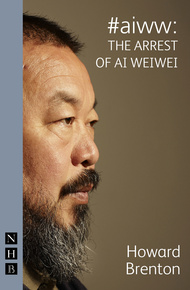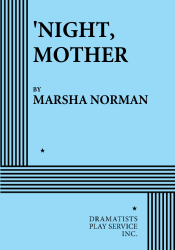
Ev'ry Time I Feel the Spirit
- Full Length Play, Drama, 20th Century
- 5M, 4F
- ISBN: E42
"I'm an artist, not an activist." -- Marian Anderson
Description
- Full Length Play
- Drama
- 120 minutes
- Time Period: 20th Century
- Target Audience: Teen (Age 14 - 18), Appropriate for all audiences, Adult
- Set Requirements: Unit Set/Multiple Settings
- Performance Group:
- Community Theatre, College Theatre / Student, High School/Secondary
REVIEWS:
"A compelling portrait of complex artist Marian Anderson."
Richard Christiansen, Chicago Tribune
Characters
- Casting: 5M, 4F
- Casting Attributes: Strong Role for Leading Woman (Star Vehicle), Minority casting
- Casting Notes: 3 of the males are black --all doubles. The 4 women are black -- 3 doubling. 2 of the men are white -- doubles.
Available Material
| Name | Price |
|---|---|
|
Ev'ry Time I Feel the Spirit Script
Order Now
Ev'ry Time I Feel the Spirit celebrates the life and voice of African-American contralto Marian Anderson. Taking place on the eve of the First Annual World Negro Arts Festival in Dakar, Senegal, 1966, Ev'ry Time I Feel the Spirit paints a sweeping portrait of Anderson as a complex artist and troubled woman moving slowly toward middle age and the evolving image of black people during the precarious Civil Rights Movement. Born in Philadelphia in 1897, Anderson managed the nearly impossible feat of carving out a legendary career as a classical concert singer. She courageously fought institutional racism and her own insecurities and fears to be recognized on her own terms within classical musical circles. Often infuriating others by grandly referring to herself in the third person, she was sometimes portrayed as a royal diva of the first order. But Anderson is seen in Ev'ry Time I Feel the Spirit as a very human artist'of the first order'with deep-seated feelings, resentments and a lifetime of regrets. Through classical music and African dance, the play chronicles the latter half of her career through a series of dramatic vignettes showing the complexities of this very important 20th-century artist who bravely defied a segregationalist ban against her 1939 concert recital in Washington, D.C., when she sang on the steps of the Lincoln Memorial that Easter Sunday. She was a woman of great contradiciton as well as conviction. Having publicly stated several times that I'm an artist, not an activist she continued to be a fearless, if at times somewhat unwitting trailblazer throughout the 1940s and 1950s in the titanic fight for desegregation. Anderson sought no fanfare or affiliation for breaking through these barriers. Having studiously avoided confrontation, never wanting to entangle her career with her silent civil rights advocacy, she never wanted to be labeled simply as 'a black singer. I only want to be known as a singer who happened to be a Negro. The play culminates with Anderson coming to terms with herself, her place in history and proving to the world that she was more'and less'a saintly American icon. An artist'of great note. Unit set. Approximate running time: 2 hours. |
$19.95 |




